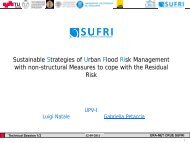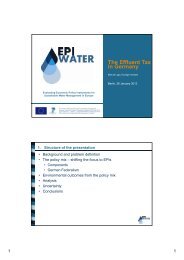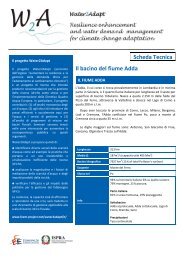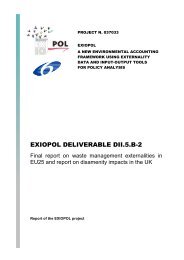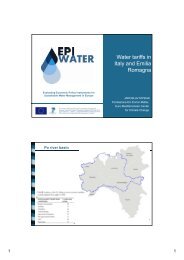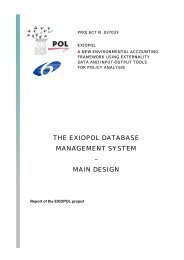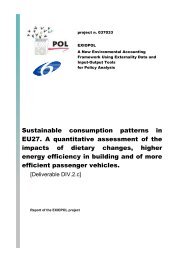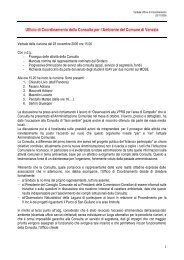Gulf and European Energy Supply Security - Feem-project.net
Gulf and European Energy Supply Security - Feem-project.net
Gulf and European Energy Supply Security - Feem-project.net
You also want an ePaper? Increase the reach of your titles
YUMPU automatically turns print PDFs into web optimized ePapers that Google loves.
announcement effect, because producers will fear<br />
dem<strong>and</strong> destruction <strong>and</strong> invest less in exp<strong>and</strong>ing or<br />
maintaining capacity; <strong>and</strong> a positive market effect,<br />
when dem<strong>and</strong> is effectively reduced. Hence, the<br />
policy indication is not to entertain policy objectives<br />
which cannot realistically be reached, but to<br />
emphasize cooperation <strong>and</strong> pragmatism.<br />
Restrictions of Passage<br />
The most dramatic situation for world oil supply<br />
would be the closure of the Strait of Hormuz. The<br />
SECURE <strong>project</strong>’s analysis has shown that closing the<br />
Strait is not easily accomplished; a good part of the<br />
<strong>Gulf</strong> production could be sent from other ports of the<br />
region <strong>and</strong> the shortage of crude oil could be made<br />
up thanks to strategic stocks under the IEA frame.<br />
The recommendation is to maintain readiness to<br />
reorient oil flows as required. The burden of this task<br />
falls primarily on the oil-producing countries. At the<br />
same time, it is necessary to maintain the capability<br />
to reopen the Strait of Hormuz, in the unlikely event<br />
that it might effectively be closed.<br />
The <strong>European</strong> Union should aim at mitigating<br />
the danger of closure of other critical sea lanes which<br />
might be caused by navigation accidents through<br />
congested passages, the most critical situation<br />
being that of the Turkish Straits. An option would<br />
be to seek a revision of the Montreux Convention of<br />
1936, to allow for the imposition of size limitations<br />
<strong>and</strong> passage charges on tankers, to discourage free<br />
riding <strong>and</strong> create conditions for the commercial<br />
development of pipeline bypasses. The EU should<br />
aim at facilitating investment in infrastructure<br />
adapted to reduce the danger of accidents <strong>and</strong><br />
vulnerability, by offering financial incentives <strong>and</strong><br />
promoting even more stringent regulations for oil<br />
<strong>and</strong> chemical tankers.<br />
Functioning of the International Oil Markets<br />
The unsatisfactory functioning of the<br />
international oil markets <strong>and</strong> the resulting<br />
uncertainty <strong>and</strong> volatility in oil prices is the main<br />
security threat for future oil supplies. Price volatility<br />
<strong>and</strong> unpredictability is at the heart of the insecurity<br />
that is felt by <strong>European</strong> citizens <strong>and</strong> governments,<br />
while in fact physical availability, especially for<br />
SECURE Project: Draft Policy Recommendations<br />
oil, has never been in question. Price volatility <strong>and</strong><br />
unpredictability discourages investment at all<br />
stages of the industry <strong>and</strong> increases the danger of<br />
supply interruptions.<br />
The root cause of price volatility is the rigidity<br />
of dem<strong>and</strong> <strong>and</strong> supply in the short term. These are<br />
impossible to change <strong>and</strong> can only be alleviated<br />
through encouraging the accumulation of larger<br />
stocks. Increasing the relative weight of trading<br />
in real (“wet”) oil barrels rather than future paper<br />
contracts <strong>and</strong> their multiple derivatives would<br />
improve the situation. This hinges on the will <strong>and</strong><br />
initiative of major oil-producing countries, but the<br />
EU should engage in a dialogue to encourage the<br />
adoption of better price discovery methods.<br />
The EU can also move in the direction of shifting<br />
the emphasis of price discovery from spot to<br />
forward pricing (normally less volatile) by imposing<br />
a time lag between the announcement <strong>and</strong> the<br />
implementation of price changes at the retail oil<br />
products level. The possibility of a flexible <strong>and</strong><br />
adjustable price b<strong>and</strong> should also be studied, to<br />
avoid price bubbles <strong>and</strong>/or spikes.<br />
The EU should establish a public agency to invest<br />
in larger storage facilities to be offered for use to<br />
oil producers (be they national or international<br />
oil companies) at low cost. The agency should<br />
be empowered to issue certificates convertible<br />
in physical barrels: oil deposited into the storage<br />
would be exchanged for such certificates, <strong>and</strong><br />
certificates could be used to withdraw oil from<br />
storage. Stored oil certificates should be designed<br />
<strong>and</strong> regulated in such a way that they will be<br />
accepted as collateral by financial institutions.<br />
The availability of an “oil bank” of this kind would<br />
encourage investment in capacity additions in<br />
anticipation of dem<strong>and</strong>, thus contributing to more<br />
comfortable supply conditions. In this perspective,<br />
the role of strategic stocks (which are rarely used<br />
<strong>and</strong> have not prevented or helped in containing<br />
major price oscillations), should also be redesigned.<br />
Their importance should be revisited in favor of<br />
a more flexible policy of encouragement to the<br />
accumulation of industry stocks.<br />
Vertical reintegration <strong>and</strong> reciprocity could<br />
also help. Specifically, the national oil companies<br />
11



